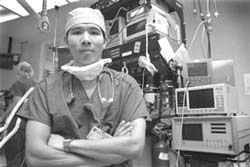Cox-2 Inhibitors Reduce Complications After Laparoscopic Surgery

CREDIT: Duke University Medical Center
Patients given a class of anti-inflammatory drugs before and after minimally invasive laparoscopic surgery experienced less pain with fewer postoperative complications and an earlier return to normal activities, according to Duke University Medical Center researchers.
The class of drugs in question, known as cyclooxygenase (COX)-2 inhibitors, block a key enzyme in the cascade of immune system events leading to inflammation. Unlike other non-steroidal anti-inflammatory drugs (NSAIDs), COX-2 inhibitors do not have any significant effect on blood platelet or gastrointestinal function.
The results of the multi-center Phase III clinical trial, which were published in the June 2004 issue of the journal Anesthesia & Analgesia, demonstrated that the use of COX-2 inhibitors lessened the amount of opiates needed to control pain, as well as reduced the incidence of postoperative nausea and vomiting (PONV). By controlling these events, the use of COX-2 inhibitors allowed patients to return home sooner and more comfortably, the researchers said.
The 24-center trial, which was led by Duke anesthesiologist Tong Joo Gan, M.D., followed 276 patients undergoing laparoscopic gall bladder removal (cholecystectomy), one of the most commonly performed minimally invasive surgical procedures.
“Ten to 15 years ago, this was an open procedure that required three or four days of recuperation in the hospital,” Gan said. “Now, with laparoscopic surgery, patients can go home the same day as surgery. With the growing popularity of minimally invasive surgery, the onus is on us as anesthesiologists to come up with ways to better control pain and reduce the incidence of PONV so patients can go home comfortably after their surgery.”
It is estimated that there are more than 35 million surgical procedures performed each year in the U.S., with 60 to 70 percent being performed on an outpatient basis. Furthermore, Gan said, as many as one in three surgical patients will suffer from PONV, making it a pressing health-care issue.
“PONV is also an issue that most physicians do not take seriously enough; they see it as a short-term nuisance that will soon pass,” Gan said. “However, studies have shown that nausea and vomiting after surgery are the major factors influencing whether or not patients are satisfied with their surgery. The patients in our trial who received the COX-2 inhibitors were significantly more satisfied with their experience than those on placebo.”
While earlier studies have demonstrated that the use of COX-2 inhibitors can reduce the need for opiates to control pain by up to 40 percent, the current trial was unique because it was among the first to show that giving the drug prior to surgery has a beneficial effect. Past studies have examined controlling side effects after the fact, instead of trying to prevent them, Gan said.
The common side effects of opiate drugs — which increase as the dosages increase — include PONV, itching, drowsiness, urinary retention and gastrointestinal disorders, according to Gan. PONV and pain are by far the main reasons for delaying discharge from the hospital, he added.
“It appears that COX-2 inhibitors not only reduce the amount of opiates needed for pain control, but that they also act synergistically by improving opiates ability to control pain,” Gan continued. “The reduced need for opiates may account for many of the benefits we found in this study, with the patients receiving COX-2 inhibitor showing a 21 percent reduction in the use of opiates immediately after surgery, as well as a reduction in the need for additional pain relief up to five days after discharge.”
While the researchers specifically examined the use of COX-2 inhibitors for laparoscopic cholecystectomy, the benefits should apply to all surgeries, including open procedures, Gan said.
“The key is giving them up front and preventing the problems before they begin,” he said, adding that past trials reviewed by the Food and Drug Administration (FDA) have focused more on treating postoperative complications than preventing them.
For the trial, patients were randomized into two groups. The first group received intravenous COX-2 inhibitors prior to surgery and then in pill form for the next seven days. The second group received placebo.
Almost one-third of the patients receiving COX-2 inhibitors resumed normal to light activity one day after surgery, compared to 7 percent in the placebo arm. By the second day, more than half of the patients receiving COX-2 inhibitors were back to normal activities, compared to 36 percent in the placebo group.
The trial was supported by Pfizer Global Pharmaceuticals, New York, manufacturer of the specific COX-2 inhibitor used in the trial. Gan has no financial interest in Pfizer.
Media Contact
More Information:
http://dukemednews.org/news/article.php?id=7635All latest news from the category: Health and Medicine
This subject area encompasses research and studies in the field of human medicine.
Among the wide-ranging list of topics covered here are anesthesiology, anatomy, surgery, human genetics, hygiene and environmental medicine, internal medicine, neurology, pharmacology, physiology, urology and dental medicine.
Newest articles
Faster, more energy-efficient way to manufacture an industrially important chemical
Zirconium combined with silicon nitride enhances the conversion of propane — present in natural gas — needed to create in-demand plastic, polypropylene. Polypropylene is a common type of plastic found…

Energy planning in Ghana as a role model for the world
Improving the resilience of energy systems in the Global South. What criteria should we use to better plan for resilient energy systems? How do socio-economic, technical and climate change related…

Artificial blood vessels could improve heart bypass outcomes
Artificial blood vessels could improve heart bypass outcomes. 3D-printed blood vessels, which closely mimic the properties of human veins, could transform the treatment of cardiovascular diseases. Strong, flexible, gel-like tubes…





















